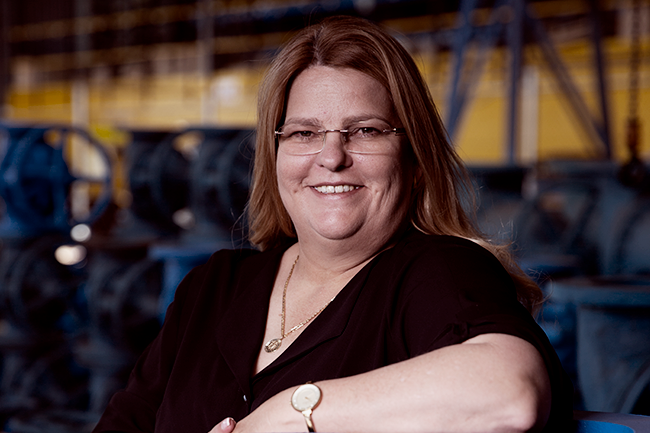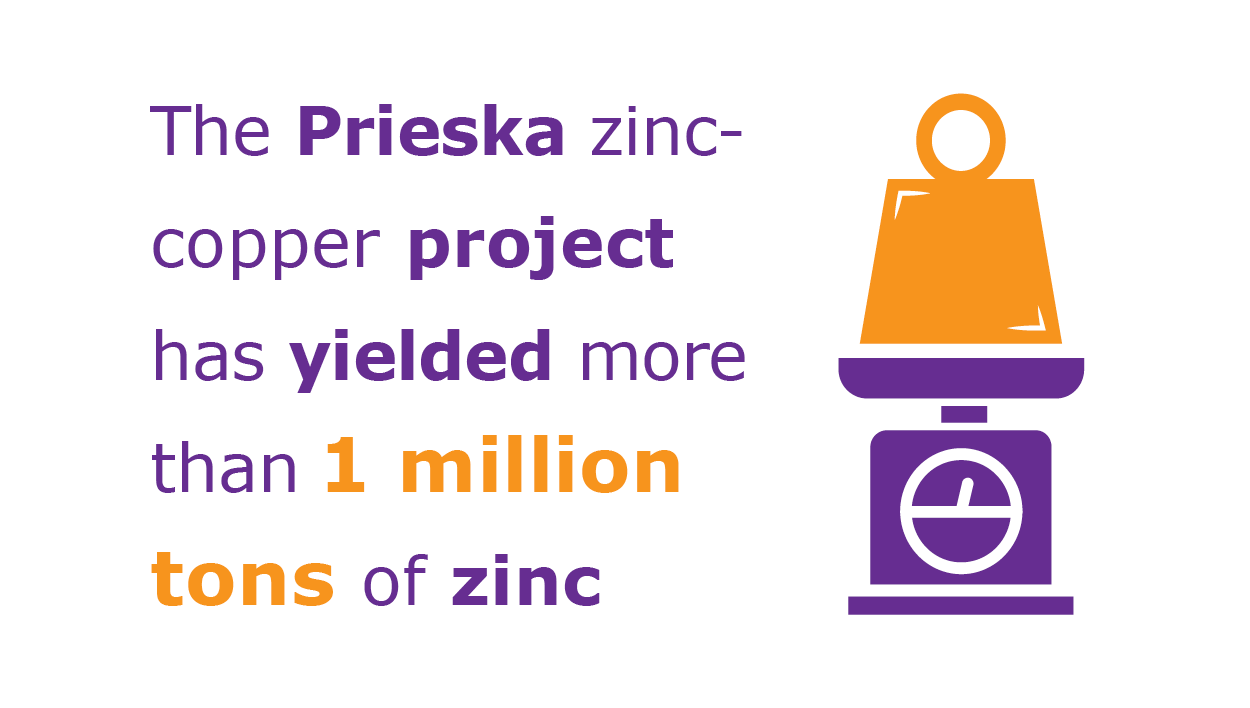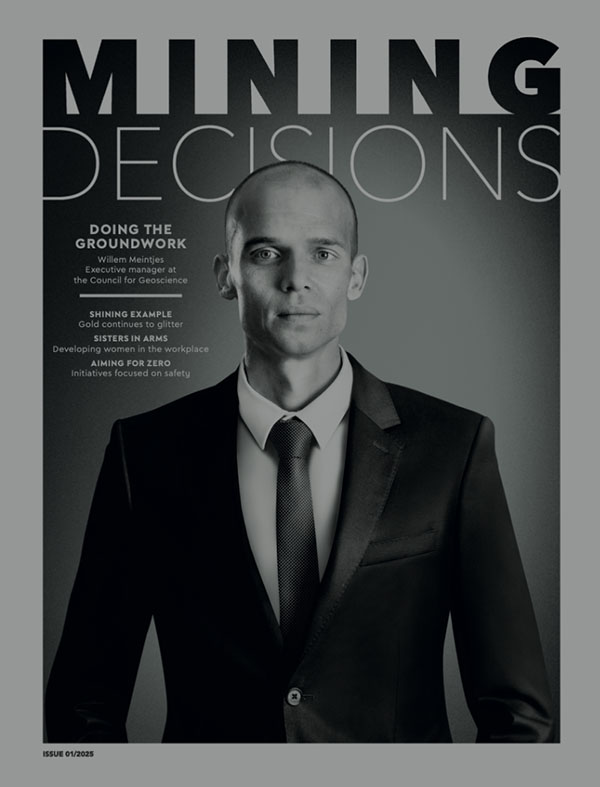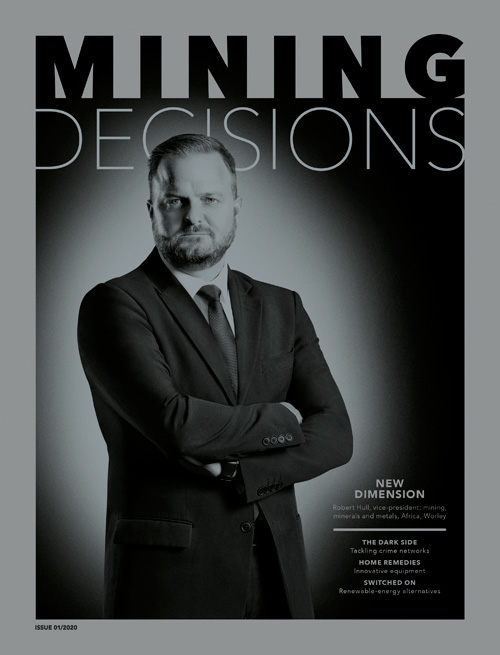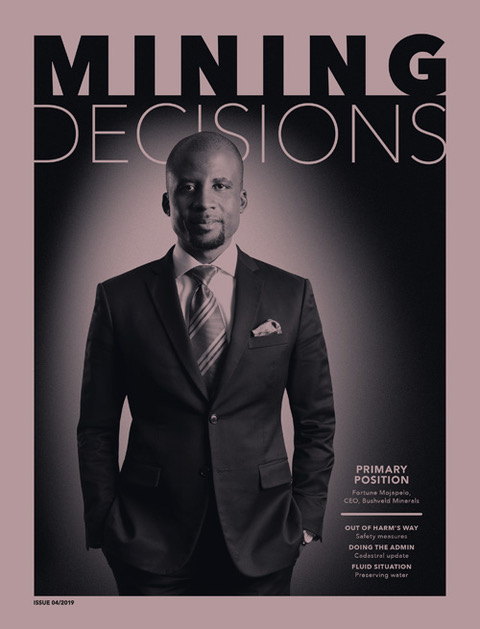If the only approach that mining businesses took was purely to meet quotas – be that those of production or enforced legislation, such as health and safety, environmental care and diversity – there would be little reason for the industry and its support services to remain an appealing career choice. Fortunately that’s not the case because, in general, the sector has voluntarily embraced culture change across all its activities, particularly that of gender diversity and inclusion.
It’s no longer an anomaly to find women underground, for example. Nor is it unusual to interact with female board and senior members of mining companies. In fact, South Africa – where Invincible Valves is based – has been hailed for having a fairly robust pipeline of female talent within the sector, more so in terms of executive management.
Pam du Plessis, MD of Invincible Valves is such an example. While she attributes her career path from accountant in 2007 to MD as ‘connecting with the right people at the right time’, over the years in this leadership role she has certainly effected not just cultural change but also exceeded her own turnaround strategy, in the process making the company one of Africa’s most successful suppliers of valve products and ancillary equipment to the mining and energy industries.
So successful, in fact, that in some ways Invincible Valves competes with its own key suppliers on their own products, which for the mining industry includes valves for slime dams, water reservoirs and wash plants, among others, as well as its in-house manufactured valve range Inval.
‘Mining corporates generally prefer to procure from one reliable supplier, even if a product falls outside of that supplier’s own range,’ says Du Plessis. ‘It is also important to be viewed as a solutions provider, meaning that it is not beyond our realm to find creative yet quality solutions, even if that means sourcing valve products beyond our usual supply chain.’
The valve environment is such that there is rarely any innovation to the physical parts required. However, technology is introducing improvements largely because the processing of mining material has itself evolved with the digital era. ‘Products, therefore, will for now remain standard, but the controls thereof do gravitate towards the Fourth Industrial Revolution-principle of new technologies,’ says Du Plessis.
Where technology has made a big difference for the organisation is in manufacture. Du Plessis says that although the business process of selling, manufacturing and reconditioning rubber line valves for the low-pressure market remains core, the introduction of its own machining division has enhanced internal production, enabling Invincible Valves to reduce lead times on custom-made goods and spares.
This, according to Du Plessis, is ‘diversifying our business and giving us more control over our supply of valves into the market’ – a market that most recently has expanded into the rest of Africa to service the Copper Belt. This is part of an all-Africa diversification strategy that Invincible Valves has been following since Du Plessis took the helm.
‘It’s obvious that larger, more developed African nations provide the best and most viable opportunities. But, in fact, our investigations into the market prove that the smaller countries, like Côte D’Ivoire, the DRC, Sierra Leone and Zimbabwe, have big needs in terms of valve products.‘No region is, however, excluded from our diversification strategy,’ says Du Plessis. ‘This year we have forged new partnerships and signed contracts across the continent with the likes of Newmont and Anglo.’
Invincible Valve’s success in penetrating Africa’s vast mining industry is largely attributed to a formula that embraces local participation. ‘We have found that the appointment of indigenous agencies and distributors eliminates many of the challenges we would face were we to attempt to embed our own operations in certain territories, given the differing regulatory frameworks, and cultural and language barriers. ‘This really is the only – and safest – way to operate in Africa, with good benefits all round. The agents benefit from earning commission and improving the variety within their supply chains, and we continue with our legacy of being a responsible trader.’
It also means that Invincible Valves is responding to the need Africa has for its workforce to contribute to local economies, acquire new skills and create jobs. On appointment of distributors and agents, the organisation provides training on its valve range and the application thereof. In some cases, this may mean visiting the company’s head office in South Africa where Invincible Valves offers South African Valve and Actuator Manufacturers Association-authorised training courses, inclusive of an introduction to valves; working with valves; and valve control. ‘We also encourage and support our agents with marketing material and tradeshow participation; monitor and assist with stock holdings; and inform [them] on costings and selling prices – all of which are imperative to ensuring consistency and access across vast regions.’
Variances in price due largely to currency fluctuations are constrained by Invincible Valves, which negotiates with its global and local suppliers to provide contract pricing, thereby allowing it to absorb a percentage of margin rates. ‘Our agents are therefore protected as best possible from pricing shocks. And because we have a reputation for the speedy delivery of supplies, only a nominal amount of stock need be carried at any particular time,’ says Du Plessis.
An advantage that all agents have is that the Invincible Valves stock is not specific to mining only, albeit the largest customer. Valves are also extensively used in petrochemical, waterworks, construction, power generation and infrastructure, as well as manufacturing and engineering. Each has its own set of nuances, which obviously requires broad knowledge of how liquids are controlled in the piping from A to B – skills that are traditionally perceived as better suited to the male workforce.
This scenario is changing in Africa, however, in light of skilled-labour shortages that are now being addressed, as more women are empowered to seek opportunities and navigate careers in high-tech environments. Du Plessis is a case in point. Her leadership skills have derived from an immersion into the technicalities of product development, industry needs and professionalism.
She has received global recognition in being given a lifetime achievement award at the 2017 Enterprising Women of the Year, held in Fort Lauderdale, US. Other accolades include being lauded by MIW (Africa’s Most Influential Woman in Business and Government) as the continental winner within the manufacturing and engineering sector in 2018.
There is an unspoken understanding that comes with being recognised as a career woman – that being to ensure other women can follow a similar path without needing to constantly pioneer. This is never more true than in male-dominated environments such as mining and engineering. While acknowledging there has been a definite shift in the number of women entering the mining and engineering sectors over the past few years, Du Plessis argues that the acceptance level of women in the industry is still far from being welcome or respected. ‘That said, it will take time,’ she says.
‘Unfortunately, women are often judged by the behaviour of others who don’t necessarily educate themselves; instead advancing through, for example, quota compliance. Those who are genuinely cutting a path are proving that women think differently, and can process information in ways that change the end result. But all that really matters to a woman when she enters male-dominated industries like mining is whether she is valued for her competency,’ says Du Plessis.
‘It requires real action, and it only really progresses when recognition is given and policies are in place to ensure she has a platform to develop. However, policies alone do not change culture. They must be aligned with meaningful sentiment so that results – not just hers but also those of the organisation – can be achieved.’

